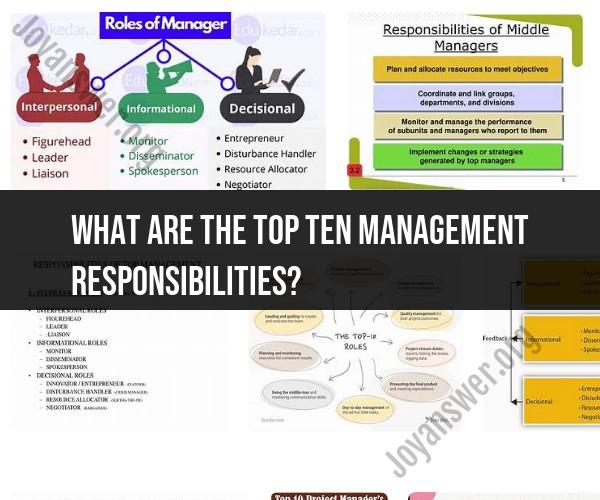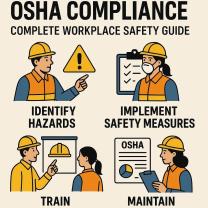What are the top ten management responsibilities?
Management responsibilities can vary depending on the organization, its size, and the industry it operates in. However, there are several core responsibilities that are typically associated with effective management. Here are the top ten management responsibilities:
Setting Goals and Objectives: Managers are responsible for defining clear and achievable goals and objectives for their teams or departments. These goals should align with the organization's overall mission and strategy.
Planning: Managers develop strategic and operational plans to achieve the defined goals. This involves allocating resources, setting timelines, and outlining the steps needed to accomplish objectives.
Organizing: Managers organize resources, including people, materials, and technology, to ensure that the plans can be executed efficiently. This may involve structuring teams, assigning roles, and establishing reporting relationships.
Leading and Motivating: Managers are responsible for leading their teams by providing direction, support, and motivation. Effective leadership can inspire employees to perform at their best and achieve organizational goals.
Decision-Making: Managers make critical decisions that affect their teams and the organization as a whole. They must weigh various factors, consider alternatives, and choose the best course of action.
Communication: Managers must communicate effectively with their teams, superiors, and other stakeholders. Clear and open communication ensures that everyone understands expectations and can work together efficiently.
Problem Solving: Managers are often called upon to identify and solve problems that arise in their departments or areas of responsibility. This requires analytical thinking and the ability to implement solutions.
Performance Evaluation: Managers assess the performance of their team members through regular evaluations and feedback. They may also recommend rewards, promotions, or corrective actions as necessary.
Budgeting and Financial Management: Managers are responsible for managing budgets and financial resources to ensure that their departments operate within allocated funds. They may also be involved in financial planning and forecasting.
Monitoring and Accountability: Managers monitor progress toward goals and hold team members accountable for their performance. They ensure that work is completed on time and in alignment with organizational standards.
It's important to note that effective management involves a combination of these responsibilities, and the emphasis on each may vary depending on the manager's level within the organization. Senior executives may focus more on strategic planning and decision-making, while frontline managers may prioritize day-to-day operations and team leadership. Adaptability and the ability to balance these responsibilities are key qualities of successful managers.
Top Ten Management Responsibilities: A Comprehensive List
- Planning: Setting goals and developing strategies to achieve those goals.
- Organizing: Allocating resources and assigning tasks to achieve goals.
- Staffing: Recruiting, hiring, training, and developing employees.
- Leading: Motivating and inspiring employees to achieve goals.
- Controlling: Monitoring progress and making adjustments to ensure that goals are met.
In addition to these five core functions, effective managers also have a number of other responsibilities, including:
- Communicating: Communicating effectively with employees, customers, and other stakeholders.
- Decision-making: Making timely and effective decisions.
- Problem-solving: Identifying and solving problems effectively.
- Teamwork: Building and leading effective teams.
- Conflict resolution: Resolving conflicts effectively.
- Change management: Managing change effectively.
- Delegation: Delegating tasks effectively.
- Performance management: Managing employee performance effectively.
- Coaching and development: Coaching and developing employees to their full potential.
- Representation: Representing the department or organization to others.
Managerial Duties: The Top Ten Responsibilities of Leaders
- Set the vision and direction for the team or organization.
- Develop and implement strategies to achieve the vision and direction.
- Build and lead a high-performing team.
- Communicate effectively with the team and other stakeholders.
- Make timely and effective decisions.
- Solve problems effectively.
- Delegate tasks effectively.
- Manage employee performance effectively.
- Coach and develop employees to their full potential.
- Represent the team or organization to others.
Effective Management: Key Tasks and Responsibilities
Effective managers have a number of key tasks and responsibilities, including:
- Setting clear and achievable goals for their team or organization.
- Developing and implementing strategies to achieve those goals.
- Building and leading a high-performing team.
- Communicating effectively with their team and other stakeholders.
- Providing feedback and coaching to their team members.
- Recognizing and rewarding good performance.
- Addressing performance issues.
- Creating a positive and productive work environment.
- Managing change effectively.
Effective managers are also able to adapt their leadership style to the needs of their team and the situation. They are able to motivate and inspire their team members, and they are able to build trust and rapport.
Ultimately, the goal of effective management is to help the team or organization achieve its goals. By carrying out their key tasks and responsibilities effectively, managers can help their team members to succeed and reach their full potential.












